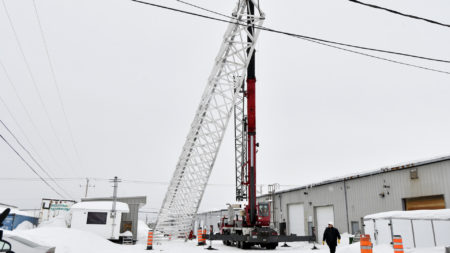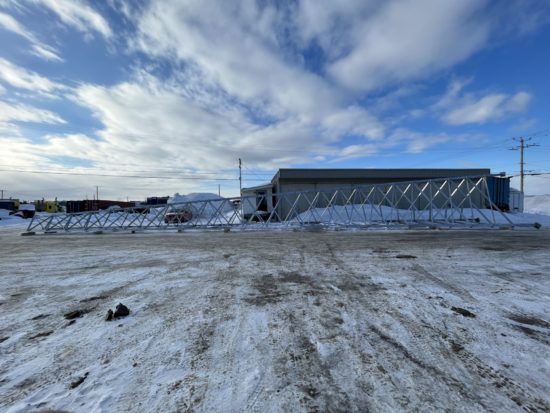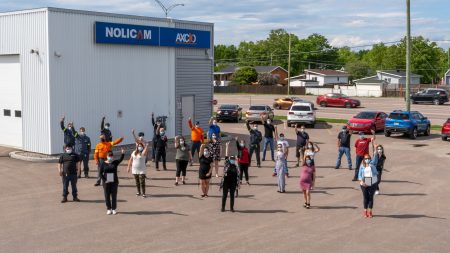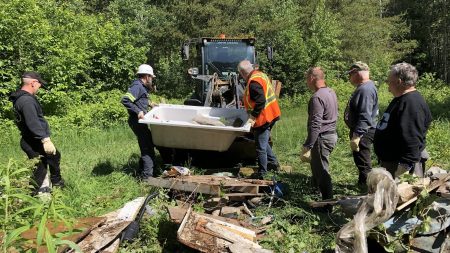REMAC Unveils First 100% Aluminium Telecommunications Tower

REMAC Tour de communicationPhoto : Jeannot Levesque
On March 16, REMAC unveiled its first 100% aluminium, CSA S37-18 certified telecommunications tower, the first of six to be installed in Pictou, Nova Scotia. This project is a great example of aluminium’s ability to find niches in new markets due to being uniquely lightweight and corrosion resistant. Regional Economic Development (RED) has backed the project from the beginning, as one of its main focuses is to support companies that promote and use aluminium. Specifically, RED provided technical assistance and put REMAC in contact with potential extruded aluminium suppliers. Rio Tinto also provided $75,000 in financial support via the Rio Tinto Fund for the Aluminium Valley Society (AVS). The new design developed for the project is sure to inspire further use of aluminium in never-before-seen applications, as noted by AVS General Manager Lilianne Savard.
“This project is a great way to showcase the region’s technological achievements,” said Joseph Langlais, Integrated Productivity Manager, Casting and Products. “We undertook a collective effort to support the project by pooling our network of experts in the field of aluminium. Our ultimate goal in this collaboration is the success of our entrepreneurs. It is thanks to our rich regional ecosystem that we are able to support an equipment manufacturer like this one, which allows us to shine a light on new perspectives that show our region’s expertise.”
This tower was based on a prototype built in 2020 in Saint-Honoré, which attracted a great deal of attention. “This tower caught the attention of major players in telecommunications,” said André Poulin, General Manager of REMAC, “which led to the creation of new frameworks to meet customer demand by developing the most sought-after wind- and ice-resistant towers in the Maritimes.”
Undeniable advantages
At 2,500 kilogrammes, the 100-foot aluminium towers are three times lighter than steel ones and can therefore be transported more easily.
“The towers come pre-assembled with all components already installed,” added Poulin. “They can be delivered in a single load, which was impossible with steel towers. The towers are mainly installed at sites that are difficult to access and require road construction and deforestation, which means significant expenses. We are now able to use a crane or helicopter to deliver a fully assembled product in a single day, compared to a week for a steel tower.”
Able to withstand winds up to 180 kilometres per hour and up to 30 millimetres of ice build-up, the towers are made to last. “We designed them to last at least 50 years,” said Poulin. “Right now, the tower is only operating at 40% of its load capacity with current technologies. This means that the other 60% can be taken up by additional equipment, which promotes infrastructure sharing in addition to extending its lifespan.
The future outlook is very positive. A market study estimated demand for these towers at 5,000 in Canada and 50,000 in the United States in the next year. This represents huge potential for the region’s plants, as the towers will require many tonnes of aluminium.

The aluminium towers are 100 feet tall and weigh 2,500 kilogrammes, three times lighter than steel ones.
About REMAC
REMAC is a CSA W47.1 and CSA W47.2 certified manufacturer of steel and aluminium products. It has a great deal of expert knowledge in aluminium transformation and manufacturing, using only the best processes on the market. Over time, REMAC has cultivated a vast network of specialists who develop its innovative, lightweight, corrosion-resistant products, providing a rapid return on customer investment through reduced maintenance costs and longer-lasting products.


